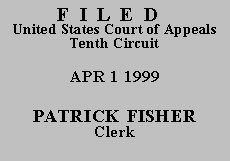

| UNITED STATES OF AMERICA,
v.
LEO ALVAREZ |
No. 98-1284
(D.C. No. 97-CR-262-D) |
§ 1291, and affirm.
While serving a prison term for bank robbery, Alvarez was charged with attempting to possess heroin. The sentencing court rejected a plea agreement Alvarez entered with the government, and sentenced him to a twenty-seven-month prison term and three years of supervised release. Alvarez argues that the court erred when it refused to reduce his base offense level under § 2X1.1(b)(1) of the United States Sentencing Guidelines ("U.S.S.G."). He also claims that the court erroneously denied his motion for a downward departure pursuant to U.S.S.G.
§ 5K2.0, and that the statutory definition of heroin is so vague and ambiguous as to warrant application of the rule of lenity.
We review a district court's application and legal interpretation of the Sentencing Guidelines de novo, but we review the court's factual findings for clear error. See United States v. Bolden, 132 F.3d 1353, 1355 (10th Cir. 1997).
Under U.S.S.G. § 2X1.1(b)(1) a court may reduce the base offense level if the defendant is charged with attempting to commit an offense. But the court may refuse to grant such a reduction if "the defendant completed all the acts the defendant believed necessary for successful completion of the substantive offense or the circumstances demonstrate that the defendant was about to complete all such acts but for apprehension or interruption by some similar event beyond the defendant's control." U.S.S.G. § 2X1.1(b)(1).
The facts show that but for interruption by prison authorities, Alvarez's sister would have transferred the heroin to him. He would have thus committed the substantive offense of heroin possession. We conclude that the district court did not err in refusing to reduce Alvarez's offense level by three levels under U.S.S.G. § 2X1.1(b)(1).
We also reject Alvarez's argument that the district court erroneously refused to depart downward under U.S.S.G. § 5K2.0. "A discretionary refusal to depart downward is not reviewable by this court unless it appears from the record the sentencing court erroneously believed the Guidelines did not permit a downward departure." United States v. Nelson, 54 F.3d 1540, 1544 (10th Cir. 1995) (citation omitted). Upon review of the record, we conclude that the district court was aware of its discretionary authority to depart downward when it refused to do so.
Appellant argues that the relevant federal drug statute defines heroin as both a controlled substance and a narcotic. The base offense level for possession of a narcotic is 13, whereas the base offense level for possession of a controlled substance is 6. See U.S.S.G. § 2P1.2(a)(2) and (3). Thus, appellant contends that the statute and the Guidelines are ambiguous and vague, and the rule of lenity should apply. His base offense level, he argues, should be calculated as if he attempted to possess a controlled substance.
When read as a whole, the statute is not ambiguous. It clearly states that certain controlled substances, like heroin, are also narcotics. See 21 U.S.C.
§ 812(b)(10) (listing heroin as an "opium derivative"); 21 U.S.C. § 802(16) (defining opium derivatives as a type of "narcotic drug"). There was no error in calculating appellant's base offense level at 13.
AFFIRMED. The mandate shall issue forthwith.
ENTERED FOR THE COURT
Carlos F. Lucero
Circuit Judge
*.The case is unanimously ordered submitted without oral argument pursuant to Fed. R. App. P. 34(a)(2) and 10th Cir. R. 34.1(G). This order and judgment is not binding precedent, except under the doctrines of law of the case, res judicata, and collateral estoppel. The court generally disfavors the citation of orders and judgments; nevertheless, an order and judgment may be cited under the terms and conditions of 10th Cir. R. 36.3.
1.18 U.S.C. § 1791(a)(2) provides that anyone possessing or attempting to possess contraband while in prison shall be subject to imprisonment or fine as stipulated in
§ 1791(b). Section 1791(d)(1)(C) lists narcotic drugs as contraband.